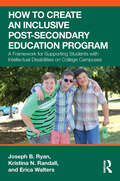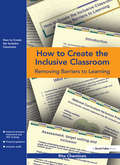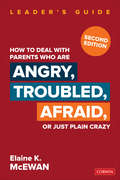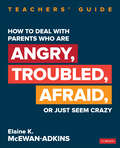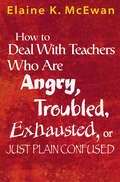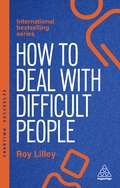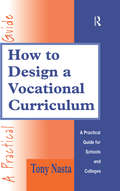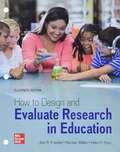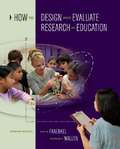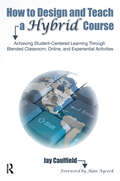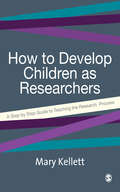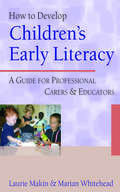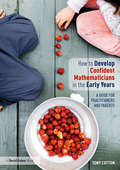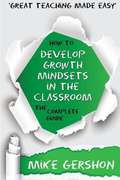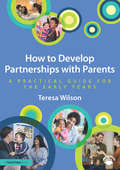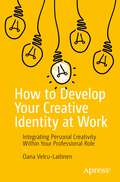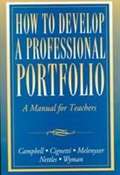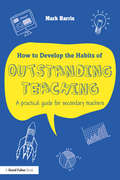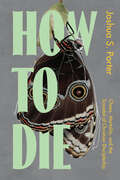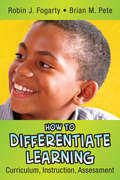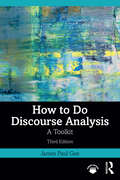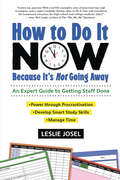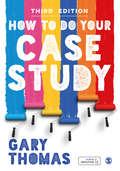- Table View
- List View
How to Create an Inclusive Post-Secondary Education Program: A Framework for Supporting Students with Intellectual Disabilities on College Campuses
by Joseph B. Ryan Kristina N. Randall Erica WaltersThis essential guide offers a practical framework for developing a successful Post-Secondary Education (PSE) program for students with intellectual disabilities—one of the fastest-growing areas in higher education. Written by leaders of one of the nation's top PSE programs, this book distills their extensive experience mentoring over 90 colleges and universities into a practical, jargon-free guide. Featuring clear, actionable insights for creating a successful, tailor-made program, chapter topics include functional academics, independent living skills, and employment readiness. Written for college administrators, special education teachers, and parents, this book sheds light on how PSE programs not only enrich the college experience for students with intellectual disabilities but also equip them with the skills to thrive as self-sufficient adults.
How to Create the Inclusive Classroom: Removing Barriers to Learning
by Rita CheminaisHot on the heels of the Government's new SEN strategy, this book's at-a- glance' format provides practitioners with a handy self-help resource. This book will help you to: create a learner-friendly barrier-free classroom using checklists to monitor inclusive practice understanding the impact on classroom practice of recent legislation following power point slides detailing government standards and guidance clarify the roles and expectations of pupils, parents, SENCOs, INCOs, teachers and school leaders
How to Deal With Parents Who Are Angry, Troubled, Afraid, or Just Plain Crazy
by Elaine K. McEwan-AdkinsHow do you deal with high-maintenance parents who never seem happy with the job you are doing? Emotionally charged, often disgruntled, and occasionally abusive parents—sound familiar? The second edition of McEwan's best-selling classic will help you manage your most difficult audience, adding several features and examples that will give you the confidence and skills you need to handle such situations, including: Over two dozen strategies—enhanced and updated—to defuse emotionally charged parents An updated, easy-to-administer healthy school checklist Fifty ways to build parental support for your school Ten goals-at-a-glance to help keep your school-community relations on target A built-in facilitator's guide
How to Deal With Parents Who Are Angry, Troubled, Afraid, or Just Seem Crazy: Teachers′ Guide (Corwin Teaching Essentials)
by Elaine K. McEwan-AdkinsStrategies for working with parents of all kinds Parents can be a teacher’s greatest advocate—and that’s why it’s important to know how to handle even the hardest parent situations. In fact, new teachers reported that parent communication is one of their biggest challenges. This teachers’ edition of the all-time best-selling How to Deal With Parents Who Are Angry, Troubled, Afraid, or Just Seem Crazy provides invaluable strategies that teachers can use to defuse angry parents and to work with all parents to advance the success of their children. Addressing a variety of educator needs and concerns, this resource • Helps teachers get parents on their side with a set of proactive practices and policies • Provides guidelines for teachers to follow when meeting with parents during annual reviews and IEP meetings • Includes advice and vignettes that reflect challenges and concerns of today’s teachers With resources that will remain relevant to teachers throughout their careers, this book provides a clear explanation of the complexities that interact to create dysfunctional parents and how teachers can most effectively problem solve, communicate, and learn from their relationships with parents.
How to Deal With Parents Who Are Angry, Troubled, Afraid, or Just Seem Crazy: Teachers′ Guide (Corwin Teaching Essentials)
by Elaine K. McEwan-AdkinsStrategies for working with parents of all kinds Parents can be a teacher’s greatest advocate—and that’s why it’s important to know how to handle even the hardest parent situations. In fact, new teachers reported that parent communication is one of their biggest challenges. This teachers’ edition of the all-time best-selling How to Deal With Parents Who Are Angry, Troubled, Afraid, or Just Seem Crazy provides invaluable strategies that teachers can use to defuse angry parents and to work with all parents to advance the success of their children. Addressing a variety of educator needs and concerns, this resource • Helps teachers get parents on their side with a set of proactive practices and policies • Provides guidelines for teachers to follow when meeting with parents during annual reviews and IEP meetings • Includes advice and vignettes that reflect challenges and concerns of today’s teachers With resources that will remain relevant to teachers throughout their careers, this book provides a clear explanation of the complexities that interact to create dysfunctional parents and how teachers can most effectively problem solve, communicate, and learn from their relationships with parents.
How to Deal With Teachers Who Are Angry, Troubled, Exhausted, or Just Plain Confused
by Elaine K. McEwan-AdkinsUse "Assertive Intervention" techniques to help difficult teachers become positive and energetic professionals! Managing difficult teachers effectively may be a principal’s most pressing challenge. In this research-based text, you will discover approaches that prove how even the most difficult teachers can become successful professionals. This indispensable handbook introduces Assertive Intervention techniques and shows principals how to improve daily interactions with troubled teachers. These strategies show how to: Confront difficult teachers calmly and confidently Conduct an Assertive Intervention Improve interactions with troublesome teachers Build a positive school culture
How to Deal with Difficult People: Fast, Effective Strategies for Handling Problem People (Creating Success)
by Roy LilleyLearn how to navigate the bullies, manipulators and complainers who drive you mad. With example dialogue and techniques, it will help you navigate tricky situations and keep your cool.By understanding the motives and individual behaviours of difficult people, you can learn to manage aggression, reduce awkwardness and remain the better person. This 6th edition of the bestselling Dealing with Difficult People features practical exercises, useful templates and top tips you need to get the best out of the worst, including how to deal with difficult customers, dealing with difficult people in the digital sphere, advice on beating bullies at their own game and how to deal with a boss who drives you barmy.The Creating Success series of books...Unlock vital skills, power up your performance and get ahead with the bestselling Creating Success series. Written by experts for new and aspiring managers and leaders, this million-selling collection of accessible and empowering guides will get you up to speed in no time. Packed with clever thinking, smart advice and the kind of winning techniques that really get results, you'll make fast progress, quickly reach your goals and create lasting success in your career.
How to Design a Vocational Curriculum: A Practical Guide for Schools and Colleges
by Nasta, TonyA practical guide that offers solutions to the problems of designing and implementing a vocational curriculum. It supplies an interpretation of all major changes taking place in the vocational curriculum, particularly regarding GNVQs, and provides assistance with programme submission.
How to Design and Evaluate Research in Education
by Norman Wallen Helen Hyun Jack FraenkelHow to Design and Evaluate Research in Education covers each step of the research process and discusses the most widely used research methodologies. It provides a comprehensive introduction to education research. End-of-chapter worksheets, comprehensive coverage of data analysis, and research tips make the text appropriate for courses that focus on doing research and for those that stress how to understand research.
How to Design and Evaluate Research in Education (7th edition)
by Jack R. Fraenkel Norman E. WallenHow to Design and Evaluate Research in Education provides a comprehensive introduction to educational research. The text covers the most widely used research methodologies and discusses each step in the research process in detail. Step-by-step analysis of real research studies provides students with practical examples of how to prepare their work and read that of others. End-of-chapter problem sheets, comprehensive coverage of data analysis, and information on how to prepare research proposals and reports make it appropriate both for courses that focus on doing research and for those that stress how to read and understand research. The authors' writing is simple and direct and the presentations enhanced with clarifying examples, summarizing charts, tables and diagrams, numerous illustrations of key concepts and ideas, and a friendly two-color design.
How to Design and Teach a Hybrid Course: Achieving Student-Centered Learning through Blended Classroom, Online and Experiential Activities
by Jay CaulfieldThis practical handbook for designing and teaching hybrid or blended courses focuses on outcomes-based practice. It reflects the author’s experience of having taught over 70 hybrid courses, and having worked for three years in the Learning Technology Center at the University of Wisconsin-Milwaukee, a center that is recognized as a leader in the field of hybrid course design. Jay Caulfield defines hybrid courses as ones where not only is face time replaced to varying degrees by online learning, but also by experiential learning that takes place in the community or within an organization with or without the presence of a teacher; and as a pedagogy that places the primary responsibility of learning on the learner, with the teacher’s primary role being to create opportunities and environments that foster independent and collaborative student learning. Starting with a brief review of the relevant theory – such as andragogy, inquiry-based learning, experiential learning and theories that specifically relate to distance education – she addresses the practicalities of planning a hybrid course, taking into account class characteristics such as size, demographics, subject matter, learning outcomes, and time available. She offers criteria for determining the appropriate mix of face-to-face, online, and experiential components for a course, and guidance on creating social presence online.The section on designing and teaching in the hybrid environment covers such key elements as promoting and managing discussion, using small groups, creating opportunities for student feedback, and ensuring that students’ learning expectations are met. A concluding section of interviews with students and teachers offers a rich vein of tips and ideas.
How to Develop Children as Researchers: A Step by Step Guide to Teaching the Research Process
by Mary Kellett'This book will be really useful to all teachers of upper Primary/lower Secondary pupils but will be especially useful as a resource for using with gifted children of 9 to12 years, as it will promote and support the type of self-directed, investigative enquiry that they enjoy. The author also emphasises the importance of the research process rather than the written product, which will appeal to all those children who dislike the written presentation of work! Each chapter outlines the learning outcomes, has a timed teaching content, and suggests a core activity; it also suggests differentiation and includes some simple 'games'. It is fully supported by photocopiable resources, making it a complete programme of work. Although written for a specific age group, this is such an excellent basic guide, it would be of use to anyone conducting research for the first time' - Eve Wilson, Education Consultant, National Association for Gifted Children 'This inspirational and innovative programme will be welcomed by all those who want to teach research skills to children. Clear discussion notes, activities and games provide everything a busy teacher needs to be able to deliver the programme. No prior knowledge of research is necessary. This is an ideal resource for those who want to offer pupils the opportunity to make their voice heard through the research process' - Dr. Ruth MacConville, Head of SENS, London Borough of Ealing 'An excellent book... a very informative guide to supporting teachers in delivering a comprehensive research training package to children and young people' - Children & Society Why teach research methodology to children? An effective and meaningful way of enhancing children's learning, doing research, empowers children to participate actively in their own education and to make original contributions to knowledge. The research carried out by children is also a vital key to improving our own understanding of children and childhood. This book's unique child-centred perspective provides an easy-to-follow model for teaching research methodology to children aged 10 and upwards. Packed with practical tips and photocopiable resources for the classroom, each chapter contains: " a core activity designed to distil the teaching content and engage children with the main learning objectives " ideas for supplementary activities and games " follow-up homework " mini boxed glossaries containing key research terms and their definitions " and suggestions for further reading. Key topics covered include: research design, data collection techniques, data analysis, dissemination, and children as active researchers.
How to Develop Children's Early Literacy: A Guide for Professional Carers and Educators
by Dr Marian R Whitehead Ms Laurie Makin`Laurie Makin's and Marian Whitehead's book on How to Develop Children's Literacy stands out from the usual guides on child development and learning. The language is accessible and engaging. The text is empowering rather than condescending in tone and in content. Teacher trainees and people working with children, including parents, who are wanting a good depth of information quickly about children's early literacy development will find this book provides it' - Childforum, New Zealand Are you studying for a vocational qualification in early childhood? Are you a qualified teacher working with under-fives for the first time? Are you a nursery nurse or teaching assistant? Or are you thinking about doing one of these things? If so, this book is for you. The years before a child starts school are crucial in establishing strong foundations for literacy. This book addresses current issues relating to early literacy. The authors offer pragmatic ideas and information on key areas including: } literacy for babies and toddlers } literacy for preschool, daycare and nursery children } play, bilingualism, special needs and official curriculum frameworks. How to Develop Children's Early Literacy is a practical guide designed to support all early literacy educators.
How to Develop Confident Mathematicians in the Early Years: A Guide for Practitioners and Parents
by Tony CottonShowing how everyday experiences can be used to encourage early mathematical thinking, this book will help you to support young children’s mathematical development through play. Developing Confident Mathematicians in the Early Years explains clearly the stages of mathematical development from birth to five years. It considers how practitioners and parents can create a mathematically rich environment and offers a wealth of practical activities and suggestions for adult–child interactions to enhance children’s mathematical learning. Features include: 60 activities, each covering a core area of mathematical experience – measurement, algebra, data handling, counting and calculation clear explanations of the mathematics taking place in each activity and how this forms the foundation for mathematical learning in the future practical suggestions for home learning and working in partnership with parents links to the EYFS and National Curriculum. Offering a rich source of ideas using everyday resources, this practical text will inspire practitioners and parents to nurture young children’s innate confidence and ability in mathematics.
How to Develop Growth Mindsets in the Classroom: The Complete Guide
by Mike GershonIn this timely and compelling book, bestselling author Mike Gershon presents you with everything you need to develop growth mindsets in your classroom. Calling on a wealth of teaching and training experience, Mike sets out the different areas of pedagogy you need to focus on, then gives you the practical strategies you can use to make change happen. With more than 200 exemplar questions and over sixty strategies, activities and techniques, this book is your go to guide for establishing, cultivating and sustaining growth mindsets in the students you teach.
How to Develop Partnerships with Parents: A Practical Guide for the Early Years
by Teresa WilsonThis definitive resource provides a comprehensive range of activities and materials enabling you to equip your staff with the knowledge, confidence and skills they need to collaborate effectively with parents as part of their early years practice. Packed with practical, reflective and team-based activities and templates, How to Develop Partnerships with Parents offers evidence-based information on working successfully with parents, and provides a range of materials to meet the specific training and development needs of your staff. Chapters emphasise the benefits of working closely with families, and acknowledge the particular needs of parents with children at various stages of development, and with SEND. Information and activities are presented in a unique, accessible format, meaning you can quickly access the materials most relevant for your staff and setting, to provide effective training and ensure that staff members can build outstanding working relationships with parents, collaborating with families to the benefit of the child. With downloadable resources, activities and opportunities for reflection throughout, this will be essential reading for Early Years managers, students and practitioners, trainers and co-ordinators.
How to Develop Your Creative Identity at Work: Integrating Personal Creativity Within Your Professional Role
by Oana Velcu-LaitinenAccording to the World Economic Forum, creativity is considered to be the third-most-important skill for employees, behind complex problem-solving and critical thinking. This book will help you rethink your creativity and its value in the work life, giving you access to intellectual, emotional, and reputational benefits that were previously unattainable. Based on a collection of interviews and research, this book translates the latest findings on the creative beliefs, confidence, and mindset into digestible thoughts for experts with an itch for improvement and innovation in domains like technology, entrepreneurship, and education. It brings a new perspective to creativity by focusing on how individuals can understand their creativity and what the implications are on what they want to achieve. How to Develop Your Creative Identity at Work is based on the most recent creativity research, which analyzes how creativity plays an important part in the individual's sense of identity. What You'll LearnUnderstand how personal beliefs about the innate creativity are influenced by past experiencesSee how the creator's personality can be shaped through new habits of curiosity, emotional risk-taking and insightEstablish a creative communication style that enables others to navigate smoothly through the challenging moments in a feedback conversationBecome an ambitious person with a sense of meaning in the work you do Identify all the familiar and less familiar in-house creative experts Who This Book Is ForThe primary reader is a knowledgeable expert, in a creative or less creative role, who is curious to bring a better fit between their inner experiences and the external environment. The secondary audience are the experts in roles like learning and development, people and culture change, and team leads who are interested in facilitating a space where employees feel safe to share their original ideas and express their curiosity.
How to Develop a Professional Portfolio: A Manual for Teachers
by Dorothy M. Campbell Pamela Bondi Cignetti Beverly J. Melenyzer Diane Hood NettlesThis reference book will guide the reader in creating a teaching portfolio that is both functional and impressive when shown in a job interview. The end product will be centered around the teaching standards that candidates need to have knowledge of in the job market today.
How to Develop the Habits of Outstanding Teaching: A practical guide for secondary teachers
by Mark HarrisThere can arguably be no greater influence on a person’s life than their education, and it is the classroom practice of teachers that helps to shape young lives. How to Develop the Habits of Outstanding Teaching aims to help teachers improve their teaching habits and practice so that every student can be supported, challenged and inspired to achieve their ambitions and goals. Providing a step-by-step guide to the key components for creating outstanding lessons, the book includes a wealth of strategies and techniques that are easy to implement and will have an immediate impact on your teaching and students. With a wide range of examples and case studies taken from different subjects, the book covers all aspects of teaching including: how to create independence, resilience and creativity; tried and test techniques for differentiation and questioning; habits and hacks to manage your time effectively; ideas on how you can coach yourself to ‘outstanding’; Memory techniques for students; literacy in lessons; marking and homework. Ideal for newly qualified teachers, as well as more experienced teachers who are looking for some fresh ideas for their lessons, this highly practical resource will instil the habits that will enable you to perform at an outstanding level consistently in the classroom.
How to Die: Chaos, Mortality, and the Scandal of Christian Discipleship
by Joshua S. PorterAnyone disenchanted with institutionalized religion and desperate for something real will welcome this subversive book&’s call to abandon performative faith and rediscover the radical way of Jesus. This isn&’t another feel-good Christian book—it&’s an unfiltered, unapologetic guide to dying to yourself. Blending storytelling, raw liturgy, and counter-cultural faith, Joshua Porter rips through the safe, sanitized versions of Christianity and reclaims the gritty, disruptive truth of the gospel. How to Die weaves together biblical narrative, ancient creeds, and personal story in a way that dares us to reconsider what it means to follow Jesus. This book isn&’t here to affirm what you already know. It&’s here to wreck your assumptions, shake your faith, and challenge you to follow Jesus beyond disillusionment and into authentic discipleship.
How to Differentiate Learning: Curriculum, Instruction, Assessment
by Brian M. Pete Robin J. FogartyLearn how to boost students' success with a differentiated instructional approach!The authors introduce the elements of the differentiated learning model and provide ways for educators to teach to the brain by considering student readiness levels, interests, and learning styles as they design instruction for K–12 classrooms. You will find guidelines and approaches for adjusting the curriculum, lessons, or assessments to offer entry points for all students. This practical text examines ways to:Prepare for differentiated instructionIdentify students' individual needsEngage students with cooperative learning and inquiry-based lessonsDevelop differentiated curriculum and assessment models
How to Do Discourse Analysis: A Toolkit
by James Paul GeeHow to Do Discourse Analysis provides a comprehensive toolkit for conducting discourse analysis, offering 26 practical tools to examine how language is used to construct meaning, enact identities, and shape social realities. Written by renowned linguist James Paul Gee, it introduces key concepts like situated meanings, social languages, and Discourses, showing how language both reflects and creates social contexts.This essential textbook takes readers through a step-by-step process of analyzing texts and talk, from examining grammar and vocabulary to uncovering underlying ideologies and power dynamics. It covers a wide range of discourse types, from everyday conversations to political speeches and social media posts. Gee draws on diverse examples from education, politics, media, and popular culture to illustrate the tools in action.While grounded in linguistic theory, the book emphasizes hands-on application. Each tool is accompanied by sample analyses and practice exercises. This new edition incorporates recent developments in digital communication and updates examples for contemporary relevance, making it an ideal resource for advanced undergraduate and postgraduate students working in the areas of applied linguistics, education, psychology, anthropology, and communication.
How to Do It Now Because It's Not Going Away: An Expert Guide to Getting Stuff Done
by Leslie JoselWith distance learning, teens are having to manage their time and attention now more than ever. Procrastination is especially tough for young adults. Getting started is overwhelming, it's hard to get motivated, not knowing how long things take messes up planning, and distractions are everywhere. We are all wired to put things off, but we can learn tools and techniques to kick this habit. This book is a user-friendly guide to help teens get their tasks done. Simple, straightforward, and with a touch of humor, it's packed with practical solutions and easily digestible tips to stay on top of homework, develop a sense of time, manage digital distractions, create easy-to-follow routines, and get unstuck. In her breezy, witty style, internationally recognized academic and parenting coach Leslie Josel opens the door to a student's view of procrastination, dives deep into what that really looks like, and offers up her Triple Ts—tips, tools and techniques—to teach students how to get stuff done…now. "Hey Guys! This book is the easiest and fastest way for you to learn how to help yourself. If your parents are constantly on you about school stuff, how you manage your time or things like that you'll definitely want to use this book." — Ryan Wexelblatt, LCSW (ADHD Dude) "Listen up, parents! This is the book that will get teens nodding their heads—and actually using the strategies and tips as they transform their study time! Teens and college students alike will feel totally empowered as they tackle their toughest obstacles: procrastination, distraction, organization, and all the rest. With real-life examples and a super-readable format, students will gain the practical help they need to power through their studies and do their best work." Amy McCready, author of The "Me, Me, Me" Epidemic: A Step-by-Step Guide to Raising Capable, Grateful Kids in an Over-Entitled World
How to Do Your Case Study
by Gary ThomasThis accessible guide takes you through the process of designing, conducting and writing up a research project using case study methods. In his characteristic warm and friendly style, Gary Thomas covers each step at a confidence-building pace, helping you to get to grips with the theory and practice of doing a case study. Focusing on vital issues like validity, reliability and quality in research, the author helps you ensure your research is rigorous and methodologically sound. This third edition: · Offers an expanded discussion of key ethical issues in case study research · Provides up to date information about using social media in research · Presents a new navigation tool to help you plan your case study project · Enables you to develop the skills you need to become a critical and reflexive researcher Covering international examples of case study in practice and accompanied by downloadable checklists and templates, this book is the perfect companion to help you successfully complete a case study.
How to Do Your Case Study
by Gary ThomasThis accessible guide takes you through the process of designing, conducting and writing up a research project using case study methods. In his characteristic warm and friendly style, Gary Thomas covers each step at a confidence-building pace, helping you to get to grips with the theory and practice of doing a case study. Focusing on vital issues like validity, reliability and quality in research, the author helps you ensure your research is rigorous and methodologically sound. This third edition: · Offers an expanded discussion of key ethical issues in case study research · Provides up to date information about using social media in research · Presents a new navigation tool to help you plan your case study project · Enables you to develop the skills you need to become a critical and reflexive researcher Covering international examples of case study in practice and accompanied by downloadable checklists and templates, this book is the perfect companion to help you successfully complete a case study.
